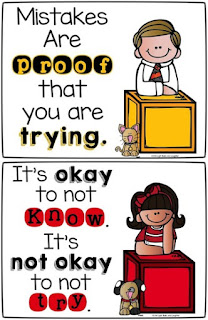Feedback Thoughts
Take risks and embrace failure
The growth mindset is a new idea that is emphasized in this class, and I must say I am a huge fan of it. Like the instructions for this assignment stated, in school "there is a huge emphasis on grades and little to no feedback, which has resulted in more students not taking risks due to the fear of failure. I think actual feedback, not just "You got this question wrong," would help students learn from their mistakes and allow for that risk to be taken in the future with more confidence as they now know what they did wrong the first time and they now know the proper way to do said risk.
While feedback has many positive things that come along with it, it is not a perfect method. For example, in the article "Silence the Critical Voices in Your Head" by Sabina Nawaz in The Harvard Business Review, I learned about how feedback can hinder productivity as well as jump start it. The article tells the story of Rajeev, a business man who asked for feedback from his employees. Though he received many positive reports, he also received the feedback that he put his goals over the relationships of his employees. Though this one piece of negative feedback was one among many positive reports, he tunnel visioned on this and slowed his pace of work. I think this is something that plagues a lot of us, as we tend to focus on the bad rather than the good. The article offers some ways to avoid this type of thinking, like looking for, hearing, understanding, and believing the positive in feedback rather than focusing on the negative. I plan to use these tips in the feedback I receive, and looking for what I did right instead of skimming over feedback to see how I could improve. This lesson is continued in "Seven ways to crush self-doubt in creative work" by John Spencer. I believe that once we begin to tunnel vision on the bad, we begin to halt ourselves from taking risks (Just like the instructions said which I have stated above.) Spencer offers some ways to avoid this, like not comparing yourself to others, abandoning perfectionism, and embracing a growth mindset. I find that the perfectionism and comparing yourself to others are connected, in that once you see that others can do what you cannot, you begin to feel doubtful in yourself because you are not perfect. I think these mindsets can be tackled when placing yourself in a team (Either literally, or imagining yourself in a team.) In a team, everyone has their specific job, and it'd be very counterproductive to make one person do everything.



Comments
Post a Comment